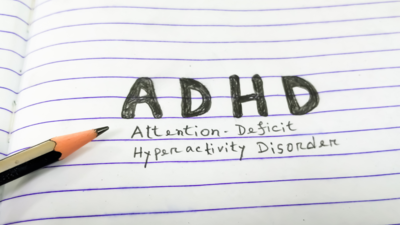- News
- City News
- mumbai News
- Uncovering neurodiversity: The hidden struggles of adults with ADHD
Trending
Uncovering neurodiversity: The hidden struggles of adults with ADHD
The article discusses the challenges faced by individuals with ADHD, the importance of recognizing neurodiverse individuals, and how coping mechanisms can mask difficulties.

“The more obvious signs were the constant hand-tapping and excessive restlessness,” she says. “He was excellent at his job, but at home, he was unreliable and could never remember a household task.On a free day, he would watch four or five movies back-to-back.”
The less obvious signs were that Arun had no emotional connection with his wife or later, their children, and the way he dismissed the existence of a problem, she says.
“For 15 years, I tried to find the root of his problems and eventually resigned thinking it was his personality.” The turnaround occurred when Shweta became a certified counsellor. That was when she realised Arun had symptoms of attention deficit hyperactivity disorder (ADHD).
Not everyone is in denial like Arun, and the symptoms can differ. Many approach mental health professionals on their own, in most cases when they “find the requirements of their jobs — attention to detail, sharp focus and meticulous functioning — difficult, or with emotional dyscontrol,” says Dr Ennapadam Krishnamoorthy, neuropsychiatrist. “A student came to me as his teachers at university found him prone to mood swings. He was diagnosed with adult ADHD.”
In fact, there is no one symptom or one condition, many of which overlap with no clear definitions. At times, symptoms like zoning out, rapidly switching topics and being unable to remember things can be mistaken as endearing. “A misconception is that as long as a person has a good job, is married and functional, they are ‘normal’,” says Shweta. “One has to examine the quality of their close relationships and their long-term struggles to see if a spectrum issue is present.”
Arun’s friends and family continue to describe him as a “successful and gentle person”. “Neurodivergent people often develop coping mechanisms that mask their difficulties. In the long run, one can observe that they struggle to have deep meaningful relationships and nuanced social skills,” says Shweta. “Anxiety is another long-term struggle that friends and extended family miss and often the spouse and children end up bearing the brunt of it.”
Actor Fahadh Faasil recently revealed, at the age of 41, that he has been clinically diagnosed with ADHD.
Last year, 39-year-old ‘Premam’ director Alphonse Puthren had posted on Instagram that he is putting an end to his film career as he believed he had autism spectrum disorder. Both these revelations were met with scepticism and even mirth, many accusing them of ‘being dramatic’ and playing to ‘new fads’.
But in Shweta’s opinion, people like Fahadh are doing others a favour by raising awareness about the condition. “Not everyone would have the money and social acceptance which gives them the luxury and courage to openly talk about their diagnosis.”
As mental health professionals, they never dismiss someone who decides to check themselves to understand if they might be neuro diverse, says counsellor Mahesh Natarajan. “A person comes only when they can’t deny how differently they perceive the world or process what they experience. Trying to fit in becomes too hard or too exhausting, and just unnecessary.”
Such people person might not use the correct terms to describe their condition, but they are suffering, regardless, and need professional help, says Shweta. The problem with ‘selfdiagnosis’ is that their anecdotes from childhood, which are crucial for a diagnosis, need corroboration.
A diagnosis is important however ,late, for the person to engage with the world in a comfortable and confident way, instead of feeling confused and conflicted, says Mahesh. It’s also important for those close to the person, who are equally affected. By the time Shweta diagnosed Arun, he was in his 40s and their marriage had long broken down.
“Undiagnosed individuals will fail to attain their human potential besides facing a number of problems in society in terms of adaptation and relationships,” says Dr Krishnamoorthy. “When not diagnosed in school, they carry the problems into work, marriage, life and society, sometimes with very deleterious consequences.”
The condition is never 100% curable, doctors say. But modification and management are possible with regular therapy and, in cases, medication. But for all, early detection and intervention are essential.
End of Article
FOLLOW US ON SOCIAL MEDIA










